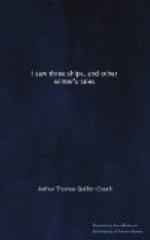The stranger laughed. “Surely he needn’t to have taken so much trouble. Smile back at me, Ruby, for I played a risky stroke to get you, and shall play a risky game for many days yet.”
He balanced himself on the arm of her chair and drew her head towards him.
“Tell me,” he said, speaking low in her ear, “if you doubt I love you. Do you know of any other man who, knowing you exactly as you are, would wish to marry you?”
She shook her head. It was impossible to lie to this man.
“Or of another who would put himself completely into your power, as I am about to do? Listen; there is no lead mine at all on Sheba farm.”
Ruby drew back her face and stared at him. “I assure you it’s a fact.”
“But the ore you uncovered—”
“—Was a hoax. I lied about it.”
“The stuff you melted in this very fire, last night—wasn’t that lead?”
“Of course it was. I stole it myself from the top of the church tower.”
“Why?”
“To gain a footing here.”
“Again, why?”
“For love of you.”
During the silence that followed, the pair looked at each other.
“I am waiting for you to go and tell your father,” said the stranger at length.
Ruby shivered.
“I seem to have grown very old and wise,” she murmured.
He kissed her lightly.
“That’s the natural result of being found out. I’ve felt it myself. Are you going?”
“You know that I cannot.”
“You shall have twenty minutes to choose. At the end of that time I shall pass out at the gate and look up at your window. If the blind remain up, I go to the vicarage to put up our banns before I set off for Plymouth. If it be drawn down, I leave this house for ever, taking nothing from it but a suit of old clothes, a few worthless specimens (that I shall turn out of my pockets by the first hedge), and the memory of your face.”
It happened, as he unlatched the gate, twenty minutes later, that the blind remained up. Ruby’s face was not at the window, but he kissed his hand for all that, and smiled, and went his way singing. The air was the very same he had whistled dumbly that morning, the air that Ruby had speculated upon. And the words were—
“’Soldier, soldier,
will you marry me,
With the bagginet, fife and
drum?’
’Oh, no, pretty miss,
I cannot marry you,
For I’ve got no coat
to put on.’
“So away she ran to the tailor’s
shop,
As fast as she could run,
And she bought him a coat
of the very very best,
And the soldier clapped it
on.
“‘Soldier, soldier, will you marry me—’”
His voice died away down the lane.
CHAPTER VII.
THE “JOLLY PILCHARDS.”
On the following Saturday night (New Year’s Eve) an incident worth record occurred in the bar-parlour of the “Jolly Pilchards” at Porthlooe.




